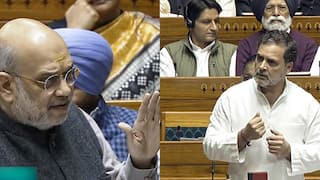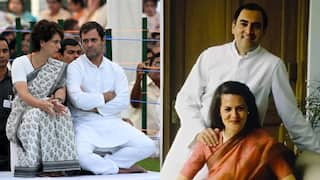‘China Is Our Biggest Security Anxiety’: Australian Deputy PM At 2+2 Ministerial Dialogue In Delhi
Australian Deputy PM Richard Marles emphasised shared security concerns with India, labeling China as a mutual challenge at the 2+2 Ministerial Dialogue in Delhi.

India and Australia engaged in the second 2+2 Ministerial Dialogue on Monday, focusing on bolstering defence cooperation and enhancing the strategic relationship. Defence Minister Rajnath Singh and External Affairs Minister S Jaishankar met with Australian Deputy Prime Minister and Defence Minister Richard Marles and Foreign Minister Penny Wong in Delhi during this diplomatic engagement.
During the dialogue, Australian Deputy Prime Minister and Defence Minister Richard Marles acknowledged the shared history, democratic traditions, and strategic alignment between India and Australia. He emphasised the crucial timing of their collaboration, especially in light of China being both countries' biggest trade partner and security concern.
"We, are two countries which share history. We share democratic traditions. We share the rule of law and freedom of speech. We share this in a world where our strategic alignment is greater than it has ever been. For both of us, China is our biggest trade partner, for both of us China is our biggest security anxiety. We share an ocean and in that sense, we are neighbours, and there has never been a more important time for our 2 countries to be working together. And from our perspective, we cannot overstate, the importance of this relationship," Marles said.
Defence Minister Rajnath Singh expressed optimism about the comprehensive strategic partnership between India and Australia. He highlighted the multifaceted cooperation across various sectors such as defence, trade, education, science and technology, and people-to-people ties. Singh emphasised the pivotal role of defence as a cornerstone of the strategic partnership, expressing confidence in elevating the collaboration to new heights. He stated, "I am sure that through this meeting today, we will move ahead to take this partnership to the next level", as quoted by news agency ANI.
At the bilateral meeting, External Affairs Minister S Jaishankar underlined the broader regional implications of the robust bilateral relationship. He discussed the challenges posed by increasing global uncertainty, emphasising the need for stability in the region amid these uncertainties. Jaishankar acknowledged the exceptional year for the India-Australia relationship, noting milestones like the Economic Cooperation and Trade Agreement (ECTA), which came into force last December.
"When it comes to 2+2, I would like to make a few points for our collective consideration. One, our bilateral relationship has certainly grown rapidly but it has larger implications for the region and a lot of other countries look to us and to our relationship in many ways as a factor of stability and security. Second, this has happened at a time when there is increasing uncertainty in the world. We are seeing sharper polarisation, deeper stresses and today while it is important to ensure that the routine is there for the region to feel safer. So, we have to build and act for stability on a daily basis. Third, we do face exceptional challenges - some regional, some global, many of them involve challenges to the rule of law and as comprehensive strategic partners, it is important to also plan for those exceptions...Fourth, our partnership in the Quad format has been very beneficial for the Indo-Pacific Region and our own bilateral relationship," he said, as per ANI.
He pointed out the significant contributions of the Indian community and students in building a "living bridge" between the two countries, "We can see today a million-strong Indian community and 100,000 plus Indian students really form a living bridge between our two countries."
ALSO READ | NIA Files Case Against Gurpatwant Singh Pannun, SFJ For Threats To Passengers Flying Air India
India, Australia Partnership Crucial For Our Region: Australian Foreign Minister Penny Wong
As Marles expressed the importance of working together on maritime domain awareness and regional diplomacy, he also shared his admiration for the Indian cricket scene, describing India as the contemporary home of cricket.
"It was an incredible privilege for me to be at the game last night...I thank India and commend India for the hosting of an incredible tournament over the last 6 weeks. It put cricket on display to the world...In a contemporary sense, the home of cricket now really is in India. And I think for those of us who love cricket, the pilgrimage that we all wanna make now is to this country. And it was just a fulfilment of a lifelong dream for me to be able to actually watch cricket being played here, in India. And the shared love of this sport by both our countries, I think embodies, the state of our relationship," the Australian Deputy Prime Minister, who watched the ODI World Cup finals in Ahmedabad, said.
Meanwhile, Australian Foreign Minister Penny Wong highlighted the deep value placed on the bilateral relationship, emphasising economic ties, trade, investment, and people-to-people links. She underscored the partnership's regional significance, characterising India as central to fostering peace, stability, and prosperity in the region.
"This is a partnership which is consequential for us but it is crucial for our region. We see India as a central, crucial to the region we continue to work for - peaceful, stable, prosperous and where sovereignty is respected," she remarked.
The Australian delegates, Wong and Marles, paid respects at the National War Memorial ahead of the meeting, recognising the longstanding military relations between the two nations.
Subscribe And Follow ABP Live On Telegram: https://t.me/officialabplive






































